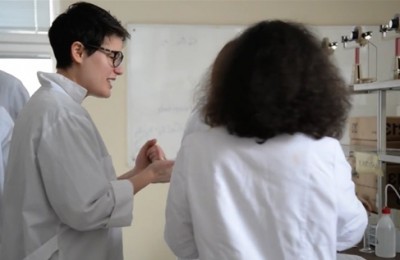High-School Biology Teacher
American College of Sofia, Bulgaria
 |
I completed the Humanities and Biology program at Carleton in 2011, spent a year teaching in England, then moved to Toronto and earned a Bachelor of Education degree, with biology and philosophy as my teaching subjects. I am now a high school Biology teacher at the American College of Sofia, in Bulgaria.
I would recommend the Humanities and Biology program to anyone who wants a complete understanding of both these subjects. Many people are surprised by this combination. I have always felt that they are not only complementary, but also closely related. Reasoning and evidence are the foundation of both. In the Humanities core seminars, we practiced the close reading of primary texts. We learned how to analyze passages, paying close attention to the structure of authors’ arguments. We honed our critical thinking skills, not only through reading the great works and writing about them, but also by actively discussing them with our peers and professors.
These abilities are all necessary in the sciences as well. We must ‘read’ data and results carefully, looking for patterns. We must analyze data and results from others’ work. We must know how to evaluate and use evidence to support conclusions. We must use critical thinking at all times. Open discussion and collaboration are often crucial to discovery in the sciences as well as in the humanities.
When I help my students develop these skills, I emphasize how useful they are not only in every school subject, but also in day-to-day life. With today’s ever-increasing access to knowledge, my students must learn to sift through and evaluate information they are presented, whether they are researching medical treatment options for a family member or reading a news article.
Skills are not the only things that matter. Nor is the knowledge gained from using these skills. An important part of science is what we do with what we learn. Studying various social and political theories at the College helped me understand the role of science in society, because understanding ethics and politics helps us understand how science can best benefit society. When my students discuss the social and ethical implications of science, my experience in the Humanities allows me to facilitate these discussions so that they can explore multiple perspectives and understand the real-world implications of what they learn.
I create inter-disciplinary projects which give my students the opportunity to make connections across subjects. When a student recently spoke to me about feeling torn between his passions for both history and biology, I explained Carleton’s Humanities and Biology program and how his passions can complement each other. His excitement and relief reminded me how thankful I was, and still am, for the opportunity I had to pursue my multiple interests. This made me a more thoughtful and responsible student of science and thus a better teacher too.
Kateri Couture-Latour is a Biology teacher at the American College of Sophia, Bulgaria